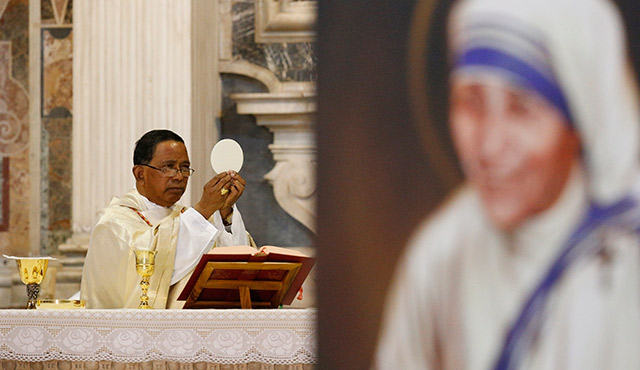There are few things more fundamental to the Catholic faith than the seven sacraments: baptism, Eucharist, reconciliation, confirmation, marriage, holy orders, and anointing of the sick. The Church teaches that these sacraments were instituted by Jesus during his public ministry as a means by which God could continue to bestow His grace on human beings.
The nature of the sacraments is described by the Catechism of the Catholic Church as follows: “The seven sacraments are efficacious signs of grace instituted by Christ and entrusted to the Church, by which divine life is dispensed to us. The visible rites by which the sacraments are celebrated signify and make present the grace proper to each sacrament. They bear fruit in those who receive them with the required dispositions.”
Father Robert Spitzer, S.J., president of the Magis Center of Reason and Faith in Garden Grove, compares the effect of receiving the sacraments, especially reconciliation and the Eucharist, which can be received repeatedly, to the effect of a good, positive friendship. “If you spend a lot of time with a friend, a part of them rubs off on you, especially if we are open and loving with that person,” Fr. Spitzer says. “The Lord starts to rub off on you through the sacraments. The more you receive the sacraments, the more you are going to be transformed into the heart of Christ.”
To better understand the role of the sacraments in the lives of Catholics, it must be accepted that God designed the rites with human nature in mind. Although the grace received is invisible, it is conveyed through materials and signs that are easily recognized and understood. These are the cleansing water of baptism, the bread and wine as Jesus used them at the Last Supper with His disciples to institute the Eucharist, the oil used in anointing, and the prayerful laying on of hands.
It should also be known that the God-given gift of free will plays a role in the reception of the sacraments. Although the amount of grace flowing from God through the sacraments is infinite, the amount of grace that each person receives can be affected by each person’s attitude, the “required dispositions” mentioned in the catechism. For example, the greater the sense of sorrow and contrition brought to the sacrament of reconciliation or the greater the sense of joy and love when receiving the Eucharist, the greater will be the grace received from those sacraments. Free will can work in the other direction, as well. A willful attitude to refuse the grace being offered can prevent a sacrament’s grace from entering the soul.
As to the person administering the sacrament, there are three requirements. He must have the power to administer the sacrament, the intention of administering the sacrament, and properly perform the ceremonies of the sacrament.
All of the sacraments give God’s sanctifying grace and, as Fr. Spitzer points out, were instituted by Jesus for four distinct reasons—to touch and transform us, to deliver God’s healing light, strengthening the sense of community with the mystical body of the Church, and relief from sin.
Baptism, whether received as an infant or an adult, is the first step in a lifelong journey of commitment to the faith and the gateway to receiving the other sacraments. As recipients perceive the real presence of Jesus in the Eucharist and partake of His Body and Blood, they are nourished spiritually and brought closer to God. In reconciliation, also known as penance, the faithful find God’s unconditional forgiveness. Confirmation is a sacrament of mature Christian commitment that is often associated with the gifts of the Holy Spirit. Anointing of the sick, once known as the last rites or extreme unction, offers strength in illness or prepares one to meet death unafraid.
The remaining two sacraments, marriage and holy orders, hold a rather unique place among the seven. Each one imposes upon the recipient responsibility for the souls of others and only rarely do people receive both in their lifetimes. In marriage, the loving union of husband and wife speaks plainly of God’s family values, in part by bringing children into the world and building the mystical body of the Church. Through holy orders, the ordained priest vows to serve God’s people and lead them to holiness, and to set an example as the visible presence of Jesus.
Seven sacraments—seven gifts from God to His people, instituted by Jesus Christ during his ministry on earth. As such, no earthly human power, not even the Church or a pope, can institute a new sacrament or alter an existing one. They will be here for the faithful until Christ returns, enriching their souls by adding the fuel of God’s grace to the spiritual fires within them.

